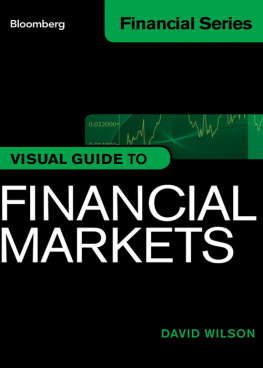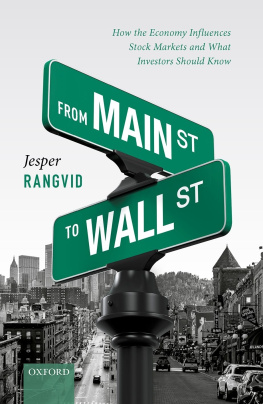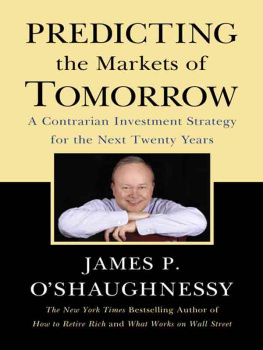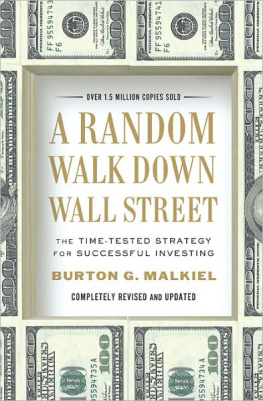Yardeni - Predicting the markets: a professional autobiography
Here you can read online Yardeni - Predicting the markets: a professional autobiography full text of the book (entire story) in english for free. Download pdf and epub, get meaning, cover and reviews about this ebook. City: United States, year: 2018, publisher: YRI Press, genre: Politics. Description of the work, (preface) as well as reviews are available. Best literature library LitArk.com created for fans of good reading and offers a wide selection of genres:
Romance novel
Science fiction
Adventure
Detective
Science
History
Home and family
Prose
Art
Politics
Computer
Non-fiction
Religion
Business
Children
Humor
Choose a favorite category and find really read worthwhile books. Enjoy immersion in the world of imagination, feel the emotions of the characters or learn something new for yourself, make an fascinating discovery.
- Book:Predicting the markets: a professional autobiography
- Author:
- Publisher:YRI Press
- Genre:
- Year:2018
- City:United States
- Rating:5 / 5
- Favourites:Add to favourites
- Your mark:
- 100
- 1
- 2
- 3
- 4
- 5
Predicting the markets: a professional autobiography: summary, description and annotation
We offer to read an annotation, description, summary or preface (depends on what the author of the book "Predicting the markets: a professional autobiography" wrote himself). If you haven't found the necessary information about the book — write in the comments, we will try to find it.
Yardeni: author's other books
Who wrote Predicting the markets: a professional autobiography? Find out the surname, the name of the author of the book and a list of all author's works by series.
Predicting the markets: a professional autobiography — read online for free the complete book (whole text) full work
Below is the text of the book, divided by pages. System saving the place of the last page read, allows you to conveniently read the book "Predicting the markets: a professional autobiography" online for free, without having to search again every time where you left off. Put a bookmark, and you can go to the page where you finished reading at any time.
Font size:
Interval:
Bookmark:

PREDICTING THE MARKETS
PREDICTING THE MARKETS
A PROFESSIONAL AUTOBIOGRAPHY
EDWARD YARDENI

Copyright 2018 Edward Yardeni
All rights reserved. No part of this book may be reproduced in any form or by any electronic or mechanical means, including information storage and retrieval systems, without permission in writing from the publisher, except by reviewers, who may quote brief passages in a review.
ISBN 978-1-948025-00-3 (Hardcover Edition)
ISBN 978-1-948025-01-0 (eBook Edition)
Library of Congress Control Number 2017919714
The author has taken all reasonable steps to provide accurate information in this book. However, no representation or warranty is made as to the fairness, accuracy, completeness, or correctness of the information and opinions contained herein. Over time, the statements made in this book may no longer be accurate, true, or otherwise correct. Over time, the authors opinions as articulated in this book may change. This book should not be relied on for investment, accounting, legal, or other professional advice. If readers desire such advice, they should consult with a qualified professional. Nothing in this bookincluding predictions, forecasts, and estimates for any and all marketsshould be construed as recommendations to buy, sell, or hold any security, including mutual funds, futures contracts, exchange-traded funds, or any other financial instruments.
Credits and permissions are listed on pages 574577 and are considered a continuation of the copyright page.
To book the author to speak at your event, please contact .
Editing by Sandra Cohan and Dania Sheldon
Front cover image by Nathalie Schueller Photography
Book design by Alex Hennig, Clear Design
Printed and bound in the United States
First printing February 2018
Published by YRI Press, a division of Yardeni Research Inc.
68 Wheatley Road
Brookville, NY, USA 11545
Contact us:
Visit the books website: yardenibook.com
To my children
Melissa, Sarah, Samuel, David, and Laura
Problems, like puzzles, are meant to be solved.
Contents
Introduction
BOOKS DONT USUALLY come with theme songs. But if I had to pick one for my professional autobiography, it would be Dont Worry, Be Happy (1988), written and sung by Bobby McFerrin. During the 40 years that I have spent on Wall Street as an economist and investment strategist, investors benefited from great bull markets in both stocks and bonds. Yet instead of being happy, it seemed to me that most investors were worried for most of that time.
Many of them found it hard to enjoy the rally in the bond market because they recalled how badly bonds had performed during the 1960s and 1970s, when inflation raged. During the subsequent great bull market in bonds, they worried that inflation would make a comeback. Instead, inflation trended lower. Consequently, the US Treasury 10-year bond yield fell from a record high of 15.84% on September 30, 1981 to a record low of 1.37% on July 8, 2016. Along the way, there were plenty of backups in bond yields, but the trends were decisively downward for interest rates and upward for bond prices.
When I started my career on Wall Street during January 1978, the Dow Jones Industrial Average was around 1000. Forty years later, it is 26 times higher, having breached 26000 in early 2018. One would think that stock investors during those years would have been euphoric. Most seldom were, because four significant bear markets along the way triggered excessive pessimism. Many investors sold in fear at the bottom of the bear markets and ventured back into the stock market only after watching stocks ascend for sufficient time to repair their shattered confidencei.e., just in time for the next bear market! In the words of Bobby McFerrin:
In your life, expect some trouble;
When you worry, you make it double
Such emotionally driven market timing would surely cause one to conclude that investing in stocks is for suckers. However, when the pessimists sold near the bottoms, they created lots of buying opportunities for the optimists.
Fortuitously, during these two coincident great bull markets in bonds and stocks, I was bullish most of the time, especially when most investors and prognosticators were extremely gloomy. Admittedly, there were times when I should have been bearish, or more bearish. In my meetings with investors, I usually warned them that I tend to be an optimist, because I had a happy childhood. In any event, for most investors, getting the bullish long-term trend right and seizing opportunities to buy has been a winning strategy for many years. It certainly has been a long good buy for stock and bond investors, as I frequently predicted.
Will this strategy continue to work? If youre sitting on a pile of bonds and stocks, should you hang on? Or should you heed the warning included in every mutual fund prospectus and investment disclosure document: Past performance is no guarantee of future returns? In other words, extrapolating past happy returns into the future could be harmful to your financial health.
I hope that my experiences on Wall Street, which this book is all about, might help guide your investment decisions with a better understanding of financial markets. The first chapter is Predicting the Past, while the final chapter is Predicting the Future. In between, I discuss all the lessons I have learned over the past four decades about forecasting the economy and financial markets. My major conclusion is that while there will always be plenty of worries requiring our attention, the next four decades should bring happy returns to investors who correctly predict the major long-term trends and use any setbacks along the way as buying opportunities.
If you are an individual investor, professional money manager, investment adviser, financial analyst, business executive, or small business owner, you should find much of interest in my book. Students of economics, finance, accounting, and business will be able to apply many of the lessons Ive learned to their own careers. Anyone studying to become a Chartered Financial Analyst will find my book helpful as well. Academics should find value in my real-world analysis, which will stimulate a better understanding of economics and finance among their students. Ive written this book to be as relevant as possible to what most of you do or will be doing soon.
More broadly, though, Ive written this book for everyone. Economics professors teach their students majoring in the subject to be academics and policymakers who go on to formulate theories and make decisions that impact all of society. One of my aims with this book is to show how economics is vitally important to all of us, because we all are affected by the theories of professors and the decisions of policymakers. We can all benefit from a better understanding of the forces that shape our financial lives.
When Ben Bernanke was a Fed governor, he said, A part of monetary policymaking for which my background left me imperfectly prepared is what central bankers call current analysis...[which]...is not taught in graduate school, probably for good reason; it seems more amenable to on-the-job training.... It is, nevertheless, an intellectually challenging activity. He added that current analysis is about getting an accurate assessment of the current economic situation, requiring a deep knowledge of the data mixed with a goodly dose of economic theory and economic judgment.
Next pageFont size:
Interval:
Bookmark:
Similar books «Predicting the markets: a professional autobiography»
Look at similar books to Predicting the markets: a professional autobiography. We have selected literature similar in name and meaning in the hope of providing readers with more options to find new, interesting, not yet read works.
Discussion, reviews of the book Predicting the markets: a professional autobiography and just readers' own opinions. Leave your comments, write what you think about the work, its meaning or the main characters. Specify what exactly you liked and what you didn't like, and why you think so.








